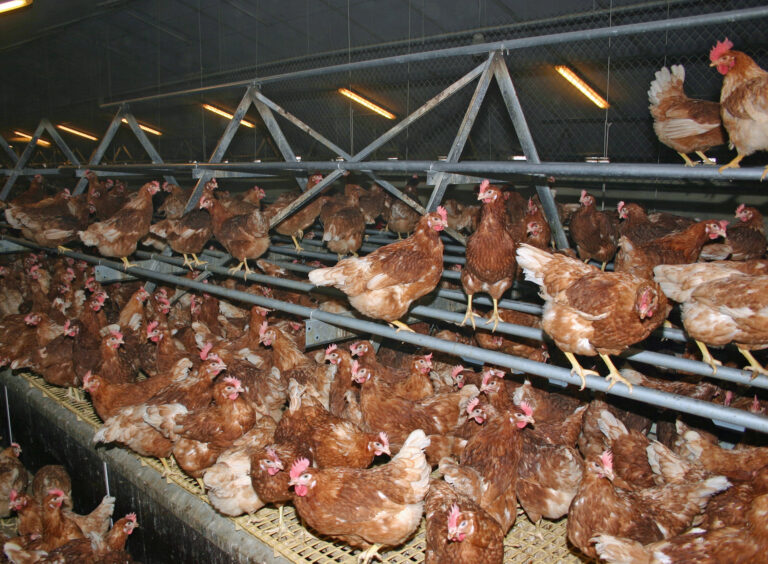A new guide sets out the steps farmers, advisors and contractors can take to reduce ammonia emissions and help improve air quality.
Defra’s Clean Air Strategy highlights that agriculture is responsible for 88% of UK emissions of ammonia gas, which ‘over-fertilises’ natural habitats with nitrogen and combines with other pollutants to produce fine Particulate Matter pollution which is harmful to human health.
The Code of Good Agricultural Practice (COGAP) for Reducing Ammonia Emissions sets out simple steps all farmers can take to reduce ammonia emissions, such as using a nutrient management plan to calculate fertiliser application rates.
It also includes more significant changes to slurry storage, spreading equipment and infrastructure, alongside innovative techniques such as slurry and digestate acidification and separation.
Environment Minister Thérèse Coffey said: “Air pollution is not just an urban issue and with 88% of ammonia emissions coming from farming, the government is taking concerted action.
“With clear new guidance and financial support we will help farmers across the country to take action, reduce emissions and help improve air quality.”
In addition to the new guidance, Defra is providing a package of financial and technical advice to help farmers reduce their emissions.
Defra is investing £3 million over the next three years to fund a specialist team of experts who will offer support, advice and guidance on the most effective ways to reduce emissions from ammonia on their land.
It will fund demonstrations of the latest low-emission spreading equipment and one-to-one advice on reducing ammonia emissions which will be available from Catchment Sensitive Farming officers by the end of this year.
The RDPE Countryside Productivity scheme is currently offering 40% grants towards much of the manure management equipment recommended in the COGAP to reduce ammonia emissions. This includes low-emission spreading equipment, slurry and digestate storage bags, digestate processing equipment and mild acidification equipment. Farmers in priority catchments for reducing water pollution may also be eligible for grants towards covers for slurry stores and lagoons under the Countryside Stewardship scheme.
The voluntary code has been written by Defra in collaboration with the National Farmers Union (NFU), the Agriculture and Horticulture Development Board and the Agricultural Industries Confederation.
Contributions have also been made by other organisations including ADAS, the British Egg Council, the Central Association of Agricultural Valuers, the Environment Agency, Linking Environment and Farming (LEAF), the National Association of Agricultural Contractors, Natural England, Plantlife and the Tenant Farmers Association.
The guide includes information on how to reduce emissions when:
- storing organic manure
- applying organic manure
- applying manufactured nitrogen fertiliser
- feeding livestock
- housing livestock
NFU environment forum chairman Mark Pope said: “The NFU welcomes the launch of the Code of Good Agricultural Practice for Reducing Ammonia Emissions. The code contains a variety of measures to reduce ammonia emissions on farm, which in many instances provide multiple benefits to the environment and resource efficiency.
“Farmers have recognised there is a need to reduce their ammonia emissions and the sector has made improvements with levels dropping by 10% in the past 30 years. However, further reductions are required from the industry in order to meet targets set under the Government’s Clean Air Strategy. We urge Defra to continue to offer farmers guidance on this issue alongside targeted financial support where necessary.”
Robert Sheasby, chief executive of the Agricultural Industries Confederation (AIC), which represents companies delivering both inputs and advice to farmers said: “We are pleased to note that the new code recognises the importance of professional advisers in guiding farm practice. Those on the Feed Adviser Register and FACTS Qualified Advisers are already undertaking additional training that will update some 4,500 professionals on the code’s requirements.
“By delivering advice tailored to the needs of individual farms, their crops and livestock, we will make a significant contribution to meeting Defra’s ambition for productivity and ammonia mitigation.”
Jill Hewitt, Technical Consultant at the National Association of Agricultural Contractors added: “Spreading manures, slurry and digestate waste has become a predominantly contractor operation and the NAAC welcomes new guidance to help farmers and contractors make decisions about the best way to apply waste to land to maximise nutrient content, and minimise air pollution.”
Nigel Penlington, Head of Environment and Buildings at the Agriculture and Horticulture Development Board said: “There is increasing pressure on farmers to control ammonia so we welcome this as a first step to help raise awareness and provide simple, practical steps to make a difference on the farm, improve the image of farming and its environmental performance and, at the same time, save farmers money and provide some benefits to the health and welfare of livestock and crop health.”


